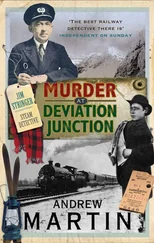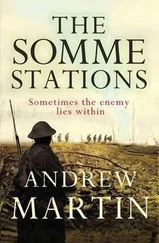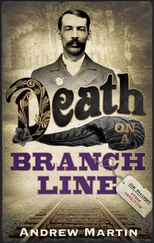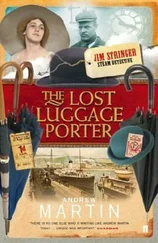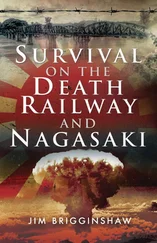Andrew Martin - The Necropolis Railway
Здесь есть возможность читать онлайн «Andrew Martin - The Necropolis Railway» весь текст электронной книги совершенно бесплатно (целиком полную версию без сокращений). В некоторых случаях можно слушать аудио, скачать через торрент в формате fb2 и присутствует краткое содержание. Жанр: Детективная фантастика, на английском языке. Описание произведения, (предисловие) а так же отзывы посетителей доступны на портале библиотеки ЛибКат.
- Название:The Necropolis Railway
- Автор:
- Жанр:
- Год:неизвестен
- ISBN:нет данных
- Рейтинг книги:5 / 5. Голосов: 1
-
Избранное:Добавить в избранное
- Отзывы:
-
Ваша оценка:
- 100
- 1
- 2
- 3
- 4
- 5
The Necropolis Railway: краткое содержание, описание и аннотация
Предлагаем к чтению аннотацию, описание, краткое содержание или предисловие (зависит от того, что написал сам автор книги «The Necropolis Railway»). Если вы не нашли необходимую информацию о книге — напишите в комментариях, мы постараемся отыскать её.
The Necropolis Railway — читать онлайн бесплатно полную книгу (весь текст) целиком
Ниже представлен текст книги, разбитый по страницам. Система сохранения места последней прочитанной страницы, позволяет с удобством читать онлайн бесплатно книгу «The Necropolis Railway», без необходимости каждый раз заново искать на чём Вы остановились. Поставьте закладку, и сможете в любой момент перейти на страницу, на которой закончили чтение.
Интервал:
Закладка:
We started wandering across the windy greyness, and what met my view was familiar from the pages of The Railway Magazine but at the same time different. Two hundred yards to our right was a broken-down loco shed with about twenty roads going into it: I knew from my reading that engines went into there but they did not come out, for the Old Shed was a locomotive's graveyard. The tracks went into it on either side of something I hadn't read of: a house that must have been a remnant of earlier streets. It made a strange sight because, even though the windows were bricked up, smoke was racing from the chimney.
Beyond the Old Shed was the New Shed, which was semi-round and a real gobstopper, with twenty roads fanning into it from two turntables. As I watched, two engines were chuffing into the grey haze that was around the shed, and two were chuffing out, heading away towards a horizon filled with black engines, more than anybody knew what to do with, just waiting, like some great army, for the work of the day.
The New Shed was dark, except for holes in the roof where the daylight came shooting in, and the smell of coal and oil had me worrying about the burning feeling that came with each intake of breath. All around was the sound of coal smashing into locos from above, coal crashing out of them into the pits below. We walked along next to a row of fancy lampposts, all lit, that ran between two lines of engines, and it was like walking along a street except with locomotives instead of houses, and all sprinkled with glittering black. I could hear twice as many men pounding away as I could see, and then I solved the mystery: half of the fellows were working under the engines with candle ends to see by.
Vincent led me to the top end of the shed, by which I mean the back of it, where there was a kind of black cricket pavillion with a name painted on the door: 'P. T. Nightingale, Yard Master'.
'Governor,' said Vincent in an under-breath as we went in, 'and Governor's Clerk.'
It was very bright and warm inside, with two fires going. There was a man in the corner with his back to me. He had an amazing quantity of white hair that looked like fleece, and was sitting at a high desk on a high stool and coughing. I could not help but think that if his desk wasn't so tall he wouldn't need such a high stool. Before me was another man sitting on a normal-sized chair at a normal-sized desk. He was also a more normal-sized fellow. He was wearing a brown bowler with no hair coming out from underneath, and he had a little face but very fiery; his head looked like the top of a match.
He looked up at me, and Vincent pointed at him, saying, 'Give Mr Nolan the token.'
Mr Nolan looked at it and called out, 'Number hundred and seventy-three,' at which the gentleman in the tall chair, still coughing, turned around. Mr Nightingale was a boozy-looking sort, and I thought: I'm standing in the red-faced room. But he was handsome all the same, and more of a hawk than a nightingale. Now Nolan was holding the token out towards me again. 'Take it back,' said Vincent.
I was pretty tired of this token by now, but did as required. Then Vincent said to the Governor, 'I expect he'll be on general cleaning so I'll take him off to Mr Flannagan.'
Vincent turned on his heel, but the Governor leant forward on his high chair, and it was like a signal moving to stop. His face was all twisted up. 'And who the hell do you think you are?' he said, 'the bloody District Locomotive Superintendent?' 'No,' said Vincent, with no question of a 'sir' to follow.
I had not expected this kind of thing from Nine Elms men; I had expected them to be all one, like the Brigade of Guards.
'You take him to stores, and find him a rule book,' said the Governor to Vincent, 'then take him to Flannagan, who can show him about, but his duties are to be set directly by me.'
'He's not coming onto the half, is he?' asked Vincent, and I didn't know what he meant, but he said it in a peevish sort of voice that would have got him stood down immediately on the North Eastern.
There was another long look between them. 'I will come down from here in a second,' said the Governor, 'and I will put you on your fucking ear.'
This was not the way it should have been; it was not the way at all. Nolan the clerk came in quickly: 'Why do you want his duties to be set from this office, Mr Nightingale? Is there any particular reason for it?'
'Bampton Twenty-Nine and Bampton Thirty-One,' said the Governor – at which Vincent cursed in an under-breath -'have not been coming off-shed to a standard of cleanliness befitting their special duties.'
'I've been going at those of late,' said Vincent. 'I've had no complaints.'
Ignoring this latest incredible remark coming from low to high, the Governor, looking at me, said, 'I'd like to see these two shining like thoroughbreds when they go to work, and I will arrange with the drivers of these locomotives for you to have a number of rides out on them. Is that clear?'
It was not clear at all, but I nodded a 'Yes, sir' as the Governor began coughing once again. As soon as we were out of there I asked Vincent who Flannagan was: 'Charge cleaner,' he muttered, and I thought again of this Henry Taylor, and wanted to ask how a Nine Elms man could just go missing, but I could see that Vincent was sulking like a camel and not keen to say anything more. As I looked at him, he turned his back on me and began walking away between two lines of locomotives.
I fished in my jacket pocket for the first of the letters from Rowland Smith, and viewed again the miracle that had brought me to this cold, crashing shed: 'I think I have the power to bring you on without resorting to the usual formalities… Testimonials will be required, however…' The letters fluttered in the icy breeze, looking suddenly very flimsy indeed. Noise was coming from all parts of the shed, like the banging of hundreds of broken pianos, yet for the time being there was not a soul in sight. Any idea that I had made a mistake – and a dangerous one at that – in coming to Nine Elms must on no account be allowed.
Chapter Three
Baytown It seems a horror to think of it now, so many years on, but the whole of my life is divided into the times before Rowland Smith came strolling along that platform at Grosmont, and the times after. 'Before' started in 1884, the year in which I was born, my mother died, and the railway came to Baytown.
Baytown, which the gentry called Robin Hood's Bay, was just a few tall thin houses – a quiver of arrows on the edge of the sea – and if one dog barked, everybody heard it. Dad thought he was the cream of Baytown because he was a butcher and not a fisherman. He told me that the trouble with Baytown wasn't that it stank of fish but that it stank of fishermen, and perhaps that's why I started to like the trains, which called at this funny, fishy little town but didn't have to stay.
If you stood on the front with your back to the sea you could see the train come across the top of the cliffs from Hawsker in the north, stop at Baytown, then head south to Ravenscar. Only two people watched them with me and the first was Crazy May, who was crazy, maybe because she had one eye lower than the other, and who all day long crushed crabs on the beach for the seagulls and couldn't remember whether it was the trains that were scared of the horses or the horses that were scared of the trains.
The other was Mr Hammond, who had been a swell in his day but had made a mistake in London which was never to be spoken of, but had put him in Queer Street, so that he could no longer be in business. When I was tiny he took me on the train to the West Cliff marshalling yard at Whitby and we would watch a little 172-class cutting fruit and fish specials. That was the engine for me because it had a name: Robin. As we watched, Mr Hammond smoked cigarettes and told me the differences between a handbrake, an engine brake and a vacuum brake, and so on. He was very amiable considering I was just a kid. "The smoke box is at the front of the engine,' he would say, 'and the firebox is at the back.' He must have told me that hundreds of times before it sank in.
Читать дальшеИнтервал:
Закладка:
Похожие книги на «The Necropolis Railway»
Представляем Вашему вниманию похожие книги на «The Necropolis Railway» списком для выбора. Мы отобрали схожую по названию и смыслу литературу в надежде предоставить читателям больше вариантов отыскать новые, интересные, ещё непрочитанные произведения.
Обсуждение, отзывы о книге «The Necropolis Railway» и просто собственные мнения читателей. Оставьте ваши комментарии, напишите, что Вы думаете о произведении, его смысле или главных героях. Укажите что конкретно понравилось, а что нет, и почему Вы так считаете.

